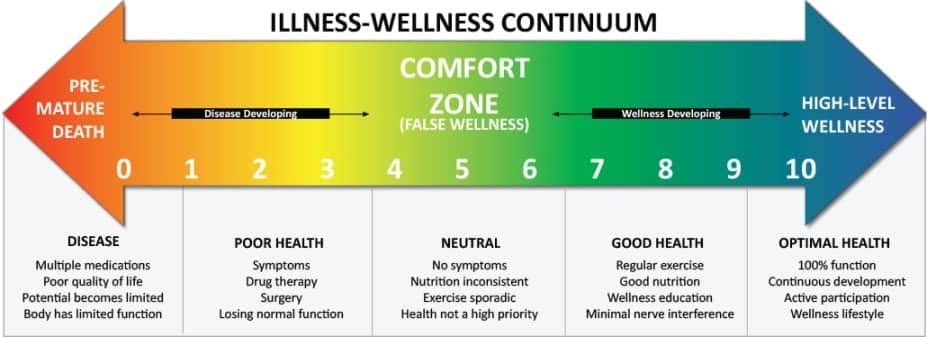Stress and Crisis Management
Challenge - an event or change that disrupts our balance and requires a response.
Stress - protective reactions that arise when faced with a challenge, when we perceive a lack of harmony between the demands of a situation and our ability to meet them.
Emotional Crisis - a strong reaction of discomfort and loss of balance in response to significant, challenging events that require new coping or adaptation methods because old ones are not effective.
Psychological Trauma - damage that occurs due to ineffective handling of stress or crisis.
 Source: https://www.houseofhealth.co.nz/wellness-continuum-physical-health/
Source: https://www.houseofhealth.co.nz/wellness-continuum-physical-health/
How to help yourself in the face of stress?
Identify your stress triggers: become aware of how you feel and recognize signs of stress – how your body reacts, what emotions arise, what thoughts come to mind, and what behaviours you exhibit.
Use relaxation techniques: inhale while counting to 7, exhale while counting to 11, tense your muscles while counting to 3, and then relax, relax your abdomen, shoulders, neck, and jaw, engage in physical activity - stretching exercises, running, or climbing stairs.
Manage your time, effort, and goals: identify your best/most productive time of day, create a to-do list and set priorities, scheduling tasks in your day, set realistic and achievable goals, diversify your activities and include breaks.
Strive for a favourable work-life balance: identify your limits and respect them, establish and maintain boundaries between work and leisure: allocate time for both "need to" and "want to" activities.
Use emotion, thought, and mindfulness management techniques: withdraw from the situation and redirect your focus elsewhere (to your surroundings or something better), express your feelings and thoughts to someone else, acknowledge and accept your emotions: "what am I feeling right now?" "this is my emotion.", practice mindfulness (such as tai-chi, yoga, meditation, or simply observing your body sensations, emotions, and thoughts in the here and now), reflect after a stressful situation: "what did i do?" "what happened?" "what would I do differently next time?", when something unpleasant is approaching, stop and ask: "what should i do about it" (mentally rehearsing problem-solving), remember how you coped in similar situations in the past.
How to help yourself in a crisis?
A crisis can last for about 2 months and has different stages, each of which is important for the recovery process:
- Confrontation with the crisis: it's important to ensure safety, seek necessary support, and stay connected with reality. This includes the shock, situation acknowledgment, and active action phases.
- Surrender to feelings: it's crucial to allow feelings to dissipate and be expressed. This can be an emotional period when it's important to express or experience pain, sadness, anger, or other emotions. It's essential to be with someone who helps you get through this stage.
- Coping: it's essential to seek solutions, draw conclusions, and help yourself grow. It involves looking for ways to overcome problems and learning from experience.
- Resolution: this stage determines whether the crisis will gain meaning and an opportunity for learning. If the coping process is successful, the crisis can give meaning to the experience and allow you to move forward. If the coping process is complex or fails for an individual, seeking help from others or professionals are essential.